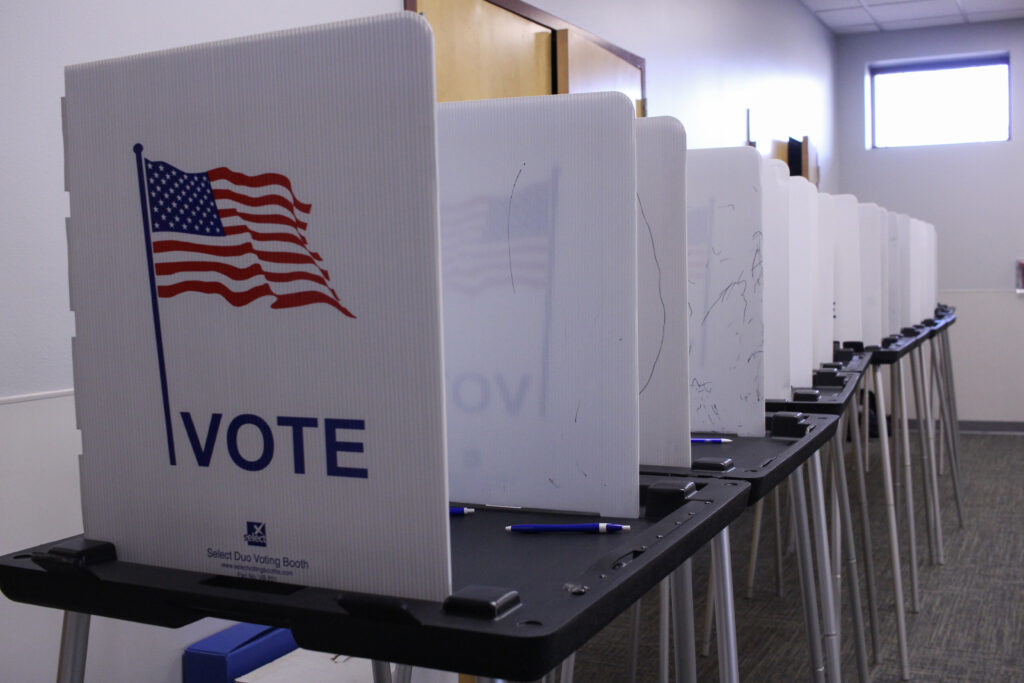Constitutional Referendums on April Ballot Address GOP ‘Zuckerbucks’ Charges
Election conspiracy theorists made unfounded charges the funding caused voter fraud.

Voting carrels set up at Madison’s Hawthorne Library on Election Day 2022. (Henry Redman | Wisconsin Examiner)
Since the 2020 election, Republicans and right wing election conspiracy theorists have often complained about “Zuckerbucks” — shorthand for the millions of dollars in grants to municipal clerks to help cover the costs of election administration during the COVID-19 pandemic awarded by the Center for Tech and Civic Life, a non-profit organization partially funded by Facebook founder Mark Zuckerberg and his wife.
The complaints have centered on the fact that Wisconsin’s five largest cities, Milwaukee, Madison, Green Bay, Racine and Kenosha, got most of the grant money — though communities across the state got funding and any municipality that applied for a grant received some money. Republicans believe that these grants amounted to bribery in an attempt to increase turnout in large, mostly Democratic-voting cities.
For years, complaints about “Zuckerbucks” have bounced around Wisconsin. The funds became a major focus of former Supreme Court Justice Michael Gableman’s widely derided review of the 2020 election and were repeatedly invoked as evidence of wider fraud by election deniers.
The complaints have also focused on the involvement of CTCL staff in municipal government when the grants were disbursed, largely targeting the organization’s involvement in Green Bay.
In next month’s spring election, voters will vote on two referenda to decide if they want to amend the state Constitution to prohibit the use of third party funds in election administration and require that only “election officials” perform election-related tasks.
In the 2021-22 legislative session, Republicans attempted to pass legislation banning the use of third party funds to cover the costs of running elections, but the bill was vetoed by Democratic Gov. Tony Evers.
To avoid the governor’s veto, Republicans instead started the process for amending the Constitution — which requires a resolution to pass in consecutive sessions and then be approved by voters in a referendum. The resolution passed the Legislature twice, with zero Democratic votes both times.
Retired Republican Sen. Kathy Bernier, who was one of the only Republicans in the Legislature to speak out against election related conspiracy theories, says the amendments are “no-brainers” that had to be put through the amendment process to get around Evers, even if it would be better passed through the normal lawmaking process.
“The reason why it’s a referendum rather than a bill is because Gov. Evers would veto that bill,” Bernier, who also previously worked as a county clerk, says. “And so we let the citizens speak and make it a constitutional amendment. It would be a better provision to be by statute rather than the Constitution. But it is what it is.”
But Jay Heck, the executive director of Common Cause Wisconsin, says it’s bad government for Republicans to push policies through the amendment process just because they can’t get them enacted into law.
“This whole new trend now, whenever you can’t get something done, and you can’t get your way in the Legislature, and you can’t reach agreement with the governor, you take it and you try to put it on the ballot,” Heck says. “It’s just not the way to make public policy. And amending the Wisconsin Constitution, the Constitution is a document that’s supposed to give direction and stability. But if you’re going to amend it every time you want something but can’t get it, it sort of makes the Constitution less, I think, respected by people and then it becomes a partisan document.”
Bernier says her problem with third party funding of elections is that the funds came with strings attached to have local election officials work to increase turnout, a role she doesn’t believe election officials should take on.
“The problem with the third party funding, is there were strings attached, there was criteria in order to obtain that third party funding. That is the problem,” she says. “So you do not need or want election officials out where they’re turning out the voters — as what has always been done by the parties or the candidates … and if the criteria for CTCL funding was that they had to go out and increase voter participation, how that looks or what occurs.”
“The bulk of the money went to the municipalities that were very high percentage of Democrat voters,” she adds. “So you can see that concern by Republicans that it was targeted to turn out Democrat voters.”
Municipalities in 38 of the state’s 72 counties received a combined $10 million in grants from CTCL but $8.6 million of those funds went to Brown, Dane, Kenosha, Milwaukee and Racine counties.
Republicans see this as evidence of partisan intent. Heck says it’s simply a reflection of the fact that more people live in the larger cities.
When the resolutions were working through the Legislature, Democrats said they didn’t want to cut off a source of funding for local governments already strained by the costs of elections when the Legislature wasn’t going to follow up the resolution with increased funds to replace the lost money.
“The money was available through the [CTCL], and it was made available to everybody,” Heck says. “Anybody that applied got grants.”
He calls Republican allegations that the money was used to increase Democratic turnout “bologna.”
“That’s garbage,” Heck says. “That’s not what it was used for. It was used to hire poll workers and provide protective equipment during the pandemic and none of it was used to do anything other than, you know, just make voting safe, whether it was in a red county in northern Wisconsin or Milwaukee, Green Bay, Madison.”
Heck adds that the resolutions are just an effort to appease election conspiracy theorists, an effort that he sees as futile after allegations of fraud in the election system have persisted for four years.
“It’s totally unnecessary, but it’s designed purely to stoke and satisfy and placate the conspiracy theorists,” Heck says.
Senate Republicans also recently killed a bill that would have allowed municipalities to start processing absentee ballots on the Monday before an election. That measure could have helped alleviate suspicions about nefarious “vote dumps” in the middle of the night in Democratic cities, where election workers can take a long time to count the high number of absentee ballots they receive.
Constitutional referenda on ballot in April take aim at Republican ‘Zuckerbucks’ complaints was originally published by Wisconsin Examiner.






















It seems like it is probably not a good idea for outside groups to be putting money with strings attached to it into our election operations. One would think this is common sense.
Vote for less clutter on ballots. Vote no.
One also would think the republicans providing more funding to run elections would be common sense. If the legislature wants the public to decide major issues than a constitutional amendment allowing binding direct referenda would make sense as well.
I do not think the party supporting this makes any difference, there is no way that outside groups on either side should have any influence on how elections are operated.
Does anyone know what these “string attached” items are?
Neither Kathy Bernier nor Ryan Cotic have provided any evidence to that effect. I am not sure any strings were attached.
OBTW, why didn’t the states and federal government provide the money needed to run the elections in 2020?
Everyone, please vote “NO” on the two state referendum questions in this Spring election.
There are three Constitutional Amendments and the Voting Rights Act of 1965 that are focused on protecting the rights of all citizens to vote. Republicans obviously do not believe in Constitutional Rights except for the Second Amendment and will do anything to keep citizens from voting.